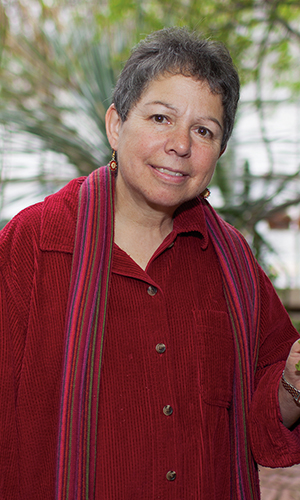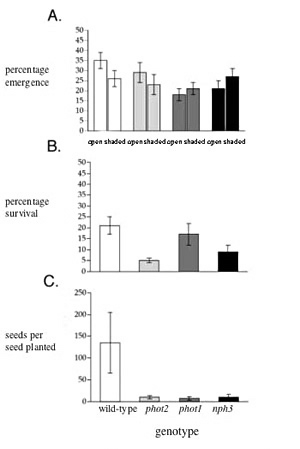Candace Galen
Candace Galen
PhD, 1983 University of Texas at Austin
Ecology and evolution in natural plant populations
FIG. 4. (A) Percentage of seedlings emerging, (B) percentage of established seedlings surviving to flowering, and (C) lifetime fitness in experimental seed plantings of four Arabidopsis thaliana genotypes. Bars show means and brackets give standard errors. Seedling emergence for each genotype is shown under open and shaded canopy levels to illustrate the significant genotype-by-canopy interaction (from Galen, Huddle, and Liscum (2004)).
Work in my laboratory uses experimental approaches to understand ecological and evolutionary responses of plants to the environment. In current research on the alpine skypilot, Polemonium viscosum, I am examining interaction webs involving host plants, pollinators and cheaters (nectar thieves). Ants acting as cheaters in the pollination mutualism between skypilots and bumblebees reduce seed production and pollen quality. Nonetheless, natural selection for bumblebees services remains strong across a wide range of ant densities. This system provides an ideal opportunity to test whether variation in cheater abundance accounts for the rarity of specialists in plant-pollinator mutualisms and to explore mechanisms of tolerance to cheaters and to floral antagonists, more broadly.
I am also interested in how climate affects biotic interaction webs. For skypilots, pollination quality declines under drought, suggesting that plant-pollinator mutualisms are sensitive to abiotic sources of environmental stress. The sensitivity of ecological relationships to climate may make plants that depend on animal partners for seed dispersal or pollination especially vulnerable to global change.
In other research I am exploring the role of physiological tradeoffs in the evolution of photoreceptors, focusing on phototropins, blue light photoreceptors in plants. In this collaboration with Mannie Liscum (MU) and Thomas Juenger (UT Austin) we are applying a cost benefit analysis to plastic responses under the control of phototropins. Research has revealed an important role for phototropins in mediating the tradeoff between carbon gain and water loss. Current experiments explore the genetic basis and fitness consequences for variation in phototropin-driven plasticity among natural populations of the genetic model, Arabidopsis thaliana.
Distinguished Fellow, Botanical Society of America 2020
Alumnae Anniversary Fund for the Recognition of Faculty Women Award 2016
UM System President's Award for Faculty Engagement - Community Engagement 2016
Excellence in Education Award, American Society of Plant Biologists 2016
Excellence in Education Award, Division of Student Affairs 2015
Science Hero of the Year, Columbia Public Schools 2014

